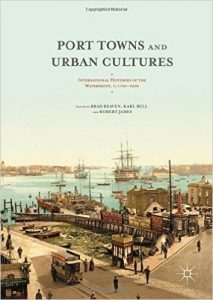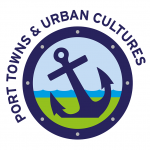 Port Towns & Urban Cultures: International Histories of the Waterfront, c.1700 – 2000, Eds. Brad Beaven, Karl Bell and Robert James, (Palgrave Macmillan: Basingstoke, 2016)
Port Towns & Urban Cultures: International Histories of the Waterfront, c.1700 – 2000, Eds. Brad Beaven, Karl Bell and Robert James, (Palgrave Macmillan: Basingstoke, 2016)
Despite the port’s prominence in maritime history, its cultural significance has long been neglected in favour of its role within economic and imperial networks. Defined by their intersection of maritime and urban space, port towns were sites of complex cultural exchanges. This book, the product of international scholarship, offers innovative and challenging perspectives on the cultural histories of ports, ranging from eighteenth-century Africa to twentieth-century Australasia and Europe. The essays in this important collection explore two key themes; the nature and character of ‘sailortown’ culture and port-town life, and the representations of port towns that were forged both within and beyond urban-maritime communities. The book’s exploration of port town identities and cultures, and its use of a rich array of methodological approaches and cultural artefacts, will make it of great interest to both urban and maritime historians. It also represents a major contribution to the emerging, interdisciplinary field of coastal studies.
The book includes the following content and chapters;
| Introduction by Brad Beaven, Karl Bell and Robert James
1. Strangers Ashore: Sailor Identity and Social Conflict in Mid-18th Century Cape Town by Nigel Worden 2. ‘Hail, Tyneside lads in collier fleets’: Song culture, sailing and sailors in North-East England by Paul Gilchrist 3. ‘They are without Christ and without Hope’: “Heathenism”, Popular Religion, and Supernatural Belief in Portsmouth’s Maritime Community, c.1851-1901 by Karl Bell 4. Hey sailor, looking for trouble? Violence, drunkenness and disorder in a Swedish Port Town: Gothenburg 1880-1920 by Tomas Nilson 5. On the Margins of Empire: Antipodean Port Cities and Imperial Culture c.1880-1939 by John Griffiths 6. Encounters on the Waterfront: Negotiating Identities in the Context of Sailortown Culture by Tytti Steel 7. Ports and Pilferers: London’s Late Georgian Era Docks as Settings for Evolving Material and Criminal Cultures by William M. Taylor 8. From Jolly Sailor to Proletarian Jack: The Remaking of Sailortown and the Merchant Seafarer in Victorian London by Brad Beaven 9. ‘If there’s one man that I admire, that man’s a British tar’ : Leisure and Cultural Nation-Building in a Naval Port Town, c. 1850-1928 by Robert James 10. The Use of ‘Local Colour’ and History in Promoting the Identity of Port Cities: The Case of Durban, c.1890s-1950s by Vivian Bickford-Smith 11. To Be a Sailor’s Wife: Ideals and Images of the Twentieth-Century Seafarer’s Wife in the Åland Islands by Hanna Hagmark-Cooper 12. Hull, Fishing and the Life and Death of Trawlertown: Living the Spaces of a Trawling Port-City by Jo Byrne 13. Doing Urban History in the Coastal Zone by Isaac Land |
 About the editors
About the editors
All three editors are founding members of the Port Towns & Urban Cultures Research Group, based at the University of Portsmouth.
Brad Beaven is Reader in Social and Cultural History at the University of Portsmouth, UK. He has written widely on British popular culture in the nineteenth and early twentieth centuries. He is the author of two monographs, Leisure, Citizenship and Working Class Men, 1850-1945 and Visions of Empire. Patriotism, Popular Culture and the City, 1870-1939.
Karl Bell is Senior Lecturer in History at the University of Portsmouth, UK. His research explores the supernatural in nineteenth-century Britain. He is the author of two monographs, The Magical Imagination: Magic and Modernity in Urban England, 1780-1914 and The Legend of Spring-heeled Jack: Victorian Urban Folklore and Popular Cultures.
Robert James is Senior Lecturer in History at the University of Portsmouth, UK. He researches British society’s leisure habits in the late-nineteenth and early-twentieth centuries, and is author of Popular Culture and Working-Class Taste in Britain 1930-39: a round of cheap diversions? and co-editor of Hollywood and the World.










Comments are closed.